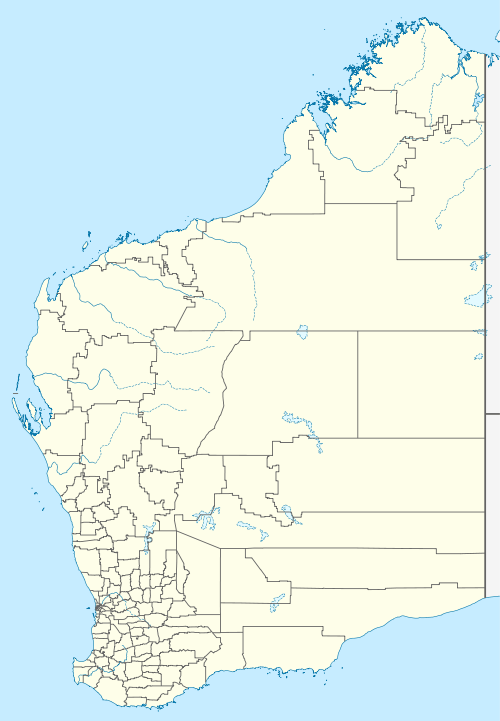Jigalong Community, Western Australia
Jigalong is a remote Indigenous Australian community of approximately 333 people located in Western Australia.
| Jigalong Western Australia | |
|---|---|
 Jigalong | |
| Coordinates | 23.358°0′S 120.781°0′E |
| Population | 333 (2016 census)[1] |
| Established | 1907 |
| Elevation | 524 m (1,719 ft) |
| Location | 1,070 km (665 mi) NNE of Perth |
| LGA(s) | Shire of East Pilbara |
| State electorate(s) | Pilbara |
| Federal Division(s) | Durack |
Location
Jigalong is in the Pilbara region of Western Australia, approximately 165 kilometres (103 mi) east of the town of Newman in the Shire of East Pilbara local government area. The community is located in an Aboriginal Lands Trust reserve on the western edge of the Little Sandy Desert.[2] The traditional owners of the land are the Martu people, represented by the Western Desert Lands Aboriginal Corporation.[3]
Demographics and facilities
The 2016 Australian census recorded the population of Jigalong as 333 people, of whom 87% were Aboriginal.[1]
The Jigalong Remote Community School provides education from kindergarten to Year 12 level, with six teachers for a student enrolment of around 120 children.[4]
The community has a medical centre run by the Puntukurnu Aboriginal Medical Services,[5] but patients with serious illnesses and injuries are usually flown to Port Hedland—400 kilometres (250 mi) north west of Jigalong—by the Royal Flying Doctor Service.[6]
In 2019, the Army Aboriginal Community Assistance Program, a joint project between National Indigenous Australians Agency (formerly the Department of Prime Minister and Cabinet) and the Australian Army, commissioned the creation of a community-owned youth centre, and facilitated the development of an outdoor barbecue setting, creek culvert and public amenities block.
The community also hosts a range of stakeholder facilities, including a BHP construction shed, and a women's centre run by Ashburton Aboriginal Corporation.[7]
History
Jigalong was established in 1907, as the location for a maintenance and rations store for workmen constructing the rabbit-proof fence. In the 1930s, it was used as a camel-breeding site, but this use was abandoned once the motor car superseded the camel as a mode of transport. In 1947, the land was granted to the Apostolic Church, which used it as a Christian mission, and set up the Aboriginal community. The land was returned to the Australian government in 1969 as an Aboriginal reserve, and was granted to the Martu people in 1974.[8]
Native title
The community is covered by the Registered Nyiyaparli Title claim (WC05/6).[9]
Town planning
Jigalong Layout Plan No.2 was prepared in accordance with State Planning Policy 3.2 Aboriginal Settlements, and was endorsed by the community in 2005 and the WAPC in 2006.[10]
In popular culture
Jigalong was the home of Molly Craig, a young Aboriginal girl whose 1,600-kilometre (990 mi) trek with her sister Daisy from the Moore River Native Settlement back to Jigalong was described in the book Follow the Rabbit-Proof Fence by Molly's daughter Doris Pilkington Garimara. In 2002, the book was made into a film, Rabbit-Proof Fence, directed by Phillip Noyce, and the film's world premiere was held in the town.[11]
References
- Australian Bureau of Statistics (27 June 2017). "Jigalong (Urban Centre/Locality)". 2016 Census QuickStats. Retrieved 26 July 2019.

- Jigalong Community Layout Plan No. 2 Planning Report & Provisions, Western Australian Planning Commission, September 2005.
- "Jigalong". Indigenous.gov.au. Australian Government. 5 October 2016. Retrieved 26 November 2019.
- Jigalong Remote Community School Archived 18 July 2008 at the Wayback Machine, TeachLive, 2005.
- Jigalong Health Centre, Puntukurnu Aboriginal Medical Services, 2019.
- The Royal Flying Doctor Service of Australia (RFDS) and the people we are proud to serve, Royal Flying Doctor Service, 12 February 2008.
- Jigalong Women's Community Centre, Ashburton Aboriginal Corporation, 2019.
- Education and School — State Records Office Archived 14 June 2005 at the Wayback Machine, State Records Office of Western Australia.
- "Australian Manganese Pty Ltd/Western Australia/David Stock and Others on behalf of the Nyiyaparli People, [2008] NNTTA 38" (PDF). National Native Title Tribunal. Retrieved 26 November 2019.
- http://www.planning.wa.gov.au/communitylayoutplans/1981.asp Planning Western Australia official site
- Thompson, Peter: Film: Rabbit-Proof Fence Archived 28 February 2009 at the Wayback Machine, Sunday (Nine Network), 24 February 2002.